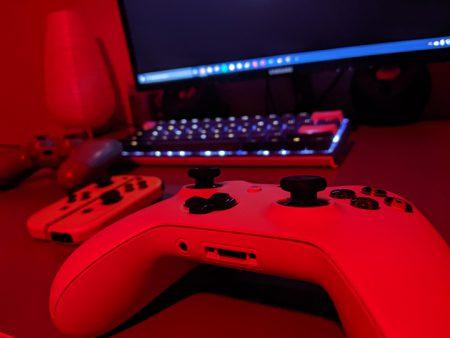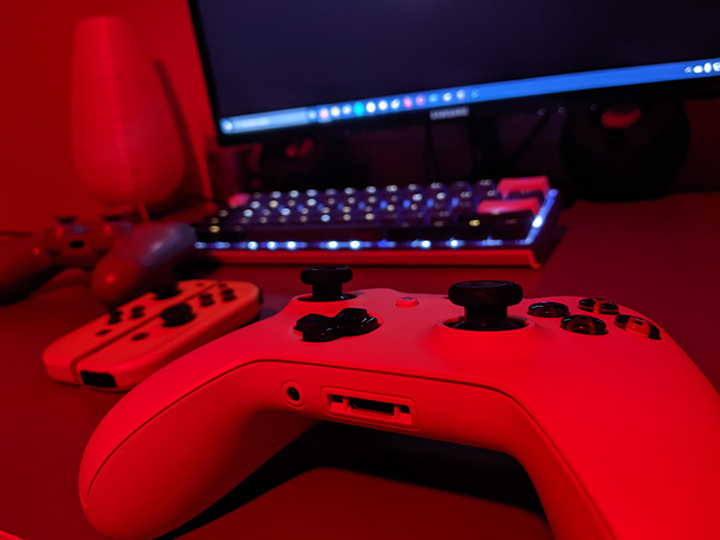JOSE ROMERO
campus editor

PlayStation’s online service has over 41.5 million subscribers
according to Statista. Xbox’s service has over 90 million.
Online gaming’s rising popularity has made its toxicity prevalent.
A toxic player is one who unpleasantly interacts with others in a game by swearing or directing slurs towards them, according to Cyber Definitions. In any given match, players interact with multiple anonymous users, sometimes leading to a negative interaction.
“I used to play ‘World of Warcraft’ and have experienced toxicity in raiding guilds,” student Christopher Anglin said. “You would join a large group of players to fight the games’ hardest bosses and dungeons. Some guilds take raiding so seriously that the guild leaders would scream and berate players during the game.”
The toxicity Anglin experienced in these groups made him leave the guild, looking for something more casual. His experience with “League of Legends” — a popular team-based game — was so negative he ended up quitting it entirely.
A survey conducted by the Anti-Defamation League discovered 81% of overall multiplayer gamers have had experience with harassment.
A reason it’s simple to experience harassment in an online video game is because of voice and text chat. Depending on the game, some have microphone or keyboard enabled communication, allowing players to speak directly to each other. On top of direct communication in matches, messages can be sent directly to a user if the option is enabled.
Multiplayer games often have filters to combat toxic interactions, but sometimes the offender is punished after the fact. Negative confrontations with others became prominent enough to warrant adding a mute feature to League of Legends, Anglin said. Communication is important in a game like League, he said, and muting a player hinders strategy, usually resulting in a loss.
Toxic experiences can have enough of a long-lasting impact to the point where online matchmaking will be avoided altogether.
“It’s a reason why I mainly keep from being online as much, just to take a break,” South Gaming Club president Reginald Garth said. “Away from these types of players and ultimately put myself into a state of relaxation before going back online.”
Garth shared an experience he had in the “Fortnite” battle royale game — large matches where players fight to be the last standing. He said his teammates let out their frustrations on him by directing derogatory and racist comments towards him.
“Normally with events like this, I just brush it off as it being one of those tryhard players upset over one tiny [loss] in a game that doesn’t hold any value outside of the gaming experience,” Garth said. “But it can tend to be a bit much when a random player constantly bugs you about little things you are doing wrong or just try to be rude for the sake of comedy.”
Game developers have begun to take action in combating toxic behavior. Rockstar Games punishes griefing players — users who deliberately irritate or harass others — in “Grand Theft Auto V” by separating them with other griefers and equipping the characters with dunce hats.
“Overwatch” uses a commendation system, rewarding players for positive behavior. The commendation system resulted in a 40% drop in toxicity, according to the website Engadget.
Not every game has software-enabled options to combat griefing, meaning players are left determining individual ways to avoid conflict.
“Playing other video games, less competitive ones, is a great tip,” South Gaming Club vice president Elijah Chapman said. “‘Animal Crossing: New Horizons’ has helped me to just enjoy the breeze and not deal with some harsh winds in ‘Super Smash Bros. Ultimate,’ I would say. I watch TV or movies after I play a game to have a fresher mind.”
It’s important to take a deep breath to calm down, Chapman said.
Games have report functionality, allowing users to submit grievances to game developers. If a person is reported enough times, they can be suspended or permanently banned from using the online service.
Toxicity in gaming gives players a bad reputation which is unfortunate because the majority aren’t toxic, sexist or racist Anglin said. Charities such as Games Done Quick and Child’s Play raise money for cancer patients and children’s hospitals.
“In my opinion, toxic gamers are like bad drivers; There aren’t nearly as many out there as the good ones, but they stand out so much more than the majority that doesn’t cause trouble,” he said

